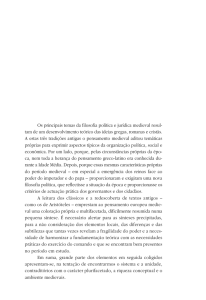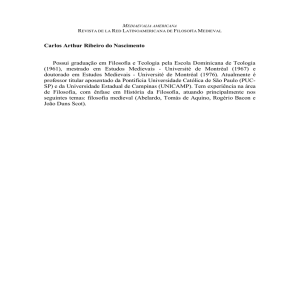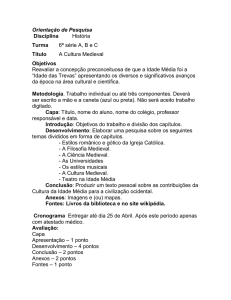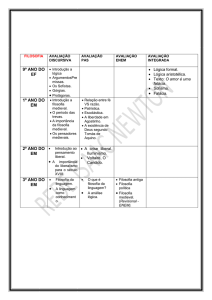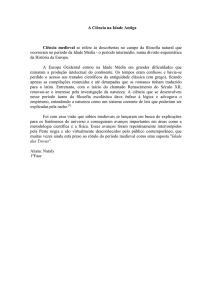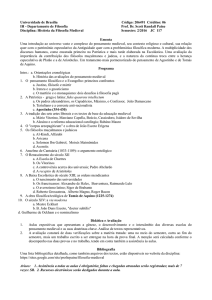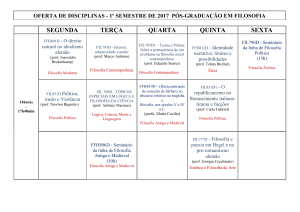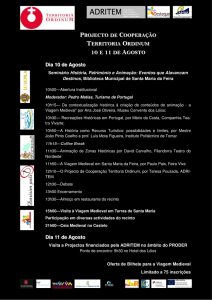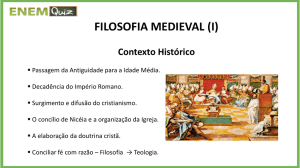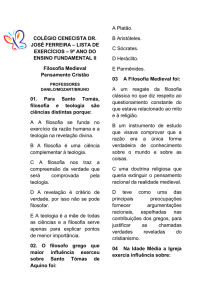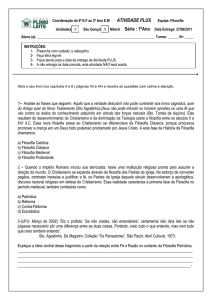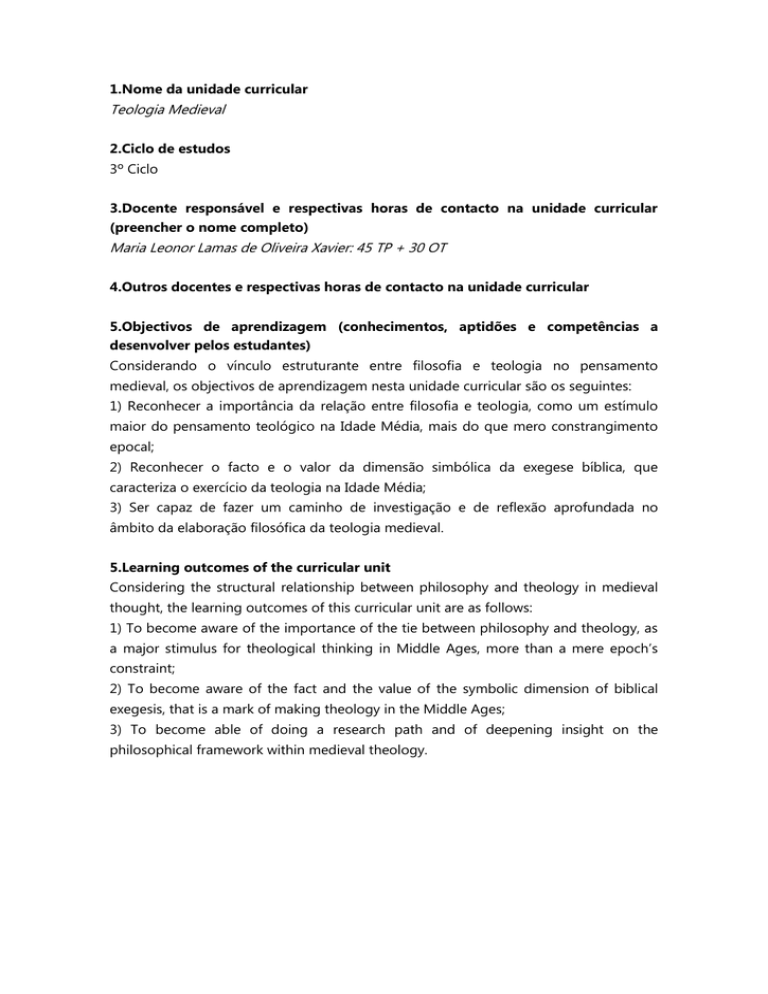
1.Nome da unidade curricular
Teologia Medieval
2.Ciclo de estudos
3º Ciclo
3.Docente responsável e respectivas horas de contacto na unidade curricular
(preencher o nome completo)
Maria Leonor Lamas de Oliveira Xavier: 45 TP + 30 OT
4.Outros docentes e respectivas horas de contacto na unidade curricular
5.Objectivos de aprendizagem (conhecimentos, aptidões e competências a
desenvolver pelos estudantes)
Considerando o vínculo estruturante entre filosofia e teologia no pensamento
medieval, os objectivos de aprendizagem nesta unidade curricular são os seguintes:
1) Reconhecer a importância da relação entre filosofia e teologia, como um estímulo
maior do pensamento teológico na Idade Média, mais do que mero constrangimento
epocal;
2) Reconhecer o facto e o valor da dimensão simbólica da exegese bíblica, que
caracteriza o exercício da teologia na Idade Média;
3) Ser capaz de fazer um caminho de investigação e de reflexão aprofundada no
âmbito da elaboração filosófica da teologia medieval.
5.Learning outcomes of the curricular unit
Considering the structural relationship between philosophy and theology in medieval
thought, the learning outcomes of this curricular unit are as follows:
1) To become aware of the importance of the tie between philosophy and theology, as
a major stimulus for theological thinking in Middle Ages, more than a mere epoch’s
constraint;
2) To become aware of the fact and the value of the symbolic dimension of biblical
exegesis, that is a mark of making theology in the Middle Ages;
3) To become able of doing a research path and of deepening insight on the
philosophical framework within medieval theology.
6.Conteúdos programáticos
Introdução
1. A exegese simbólica ou a Bíblia para além da letra
1.1. A tradição da exegese medieval: Henri de Lubac
1.2. O caso de Santo António de Lisboa: F. Gama Caeiro
1.3. A teologia simbólica no circuito das teologias do Pseudo-Dionísio
1.4. A exegese simbólica da filosofia: São Boaventura.
2. Teologia filosófica ou filosofia teológica?
2.1. Uma filosofia teológica: Santo Anselmo
2.2. A autonomia e os limites da teologia natural: São Tomás de Aquino
2.3. A existência de Deus como uma questão disputada
2.3.1. Santo Anselmo
2.3.2. São Boaventura
2.3.3. São Tomás de Aquino
2.3.4. João Duns Escoto
2.3.5. Guilherme de Ockham
6.Syllabus
Introduction
1. The symbolic exegesis or the Bible beyond literalness
1.1. The tradition of medieval exegesis: Henri de Lubac
1.2. The case of St. Antonio of Lisbon: F. Gama Caeiro
1.3. The symbolic theology in Pseudo-Dionysus’ circuit of theologies
1.4. The symbolic exegesis of philosophy: St. Bonaventure
2. Philosophical theology or theological philosophy?
2.1. A theological philosophy: St. Anselm
2.2. The autonomy and the limits of natural theology: St. Thomas Aquinas
2.3. The existence of God as a quaestio disputata
2.3.1. St. Anselm
2.3.2. St. Bonaventure
2.3.3. St. Thomas Aquinas
2.3.4. John Duns Scotus
2.3.5. William of Ockham
7.Demonstração da coerência dos conteúdos programáticos com os objectivos de
aprendizagem da unidade curricular
Os conteúdos programáticos adequam-se aos objectivos de aprendizagem porque a
relação com a filosofia é estruturante da teologia medieval. De facto, a teologia
medieval é, em parte, exegese bíblica e, em parte, filosofia. Sobre a parte exegética,
cabe salientar a superioridade do espírito à letra, que torna predominantemente
simbólica a exegese medieval. A par da exegese simbólica, a teologia medieval
desenvolveu uma parte filosófica, com maior autonomia ainda relativamente à letra do
texto bíblico, que pensa o tema de Deus nos limites da racionalidade humana. Como
esses limites eram culturalmente determinados pelas filosofias neoplatónica e
aristotélica, o pensamento medieval é, em grande medida, uma expressão da expansão
teológica destas filosofias sob o influxo das religiões do Livro, mormente do
cristianismo no mundo latino.
7.Demonstration of the syllabus coherence with the curricular unit's objectives
The syllabus is coherent with the curricular unit´s objectives because medieval theology
has a structural relationship with philosophy. Indeed medieval theology is partly biblical
exegesis and partly philosophy. On the exegetical part, it must be pointed out that
spiritus is worthier than littera and therefore medieval exegesis becomes mainly
symbolic. Together with the symbolic exegesis the medieval theology has developed a
philosophical part even more autonomous from the littera of the biblical text, thinking
on God within the limits of human rationality. Once such limits were culturally marked
by the neo-platonic and the Aristotelian philosophical traditions, the medieval thought
is greatly an expression of the theological expansion of such philosophies under the
influx of the Book religions, mainly of the Christian religion in the Latin world.
8.Metodologias de ensino (avaliação incluída)
Esta unidade curricular caracteriza-se pela metodologia de seminário, lendo e
interpretando textos fundamentais de teólogos medievais. As sessões lectivas regulares
são complementadas pela componente de orientação tutorial dos estudantes.
A avaliação é composta por 2 elementos obrigatórios:
1) Um trabalho orientado e escrito sobre um tópico dos conteúdos programáticos a
entregar no período de avaliação;
2) Uma exposição oral do trabalho em curso a agendar e a realizar nas sessões
semanais do período lectivo.
A classificação final é ponderada em conformidade com os seguintes parâmetros:
- A regularidade e o progresso para a qualidade da investigação preparatória;
- A clareza, o espírito crítico e a informação em especialidade para a qualidade do
trabalho escrito;
- A clareza e as capacidades de síntese e argumentação para a qualidade da exposição
oral.
8.Teaching methodologies (including evaluation)
This curricular unit is characterized by the seminar methodology, reading and
interpreting fundamental texts of medieval theologians. The regular lecturing sessions
are complemented by tutorial attendance of the students.
The assessment has two compulsory elements:
1) A supervised paper on one of the syllabus’ topics, to be delivered during the
assessment period;
2) An expounding moment of the paper in course, to take place during the regular
lecturing sessions.
The final grade is pondered according to the following parameters:
- The regularity and the progress for the quality of the preparatory research;
- The clarity, the capacity of criticism and specialized information for the quality of the
paper;
- The clarity with synthesis and argumentation’s skills for the quality of the expounding
moment.
9.Demonstração da coerência das metodologias de ensino com os objectivos de
aprendizagem da unidade curricular
Esta unidade curricular adequa as suas práticas de ensino aos seus objectivos através
dos seguintes procedimentos:
- As sessões lectivas regulares destinam-se ao desenvolvimento dos conteúdos
programáticos, com base na leitura de textos fundamentais de teologia da Idade
Média, e proporcionam a apresentação e a discussão dos trabalhos em curso.
- O acompanhamento tutorial é o procedimento que se ajusta à orientação do trabalho
escrito caso a caso, promovendo a exigência de um trabalho científico de qualidade e
respeitando o perfil individual do estudante no seu percurso de investigação.
9.Demonstration of the coherence between the teaching methodologies and the
learning outcomes
This curricular unit puts its teaching methodologies in harmony with the learning
outcomes through the following proceedings:
- The regular lecturing sessions are designed for the syllabus’ development, by the
reading of medieval fundamental texts of theology, and offer the occasion to the
expounding of the student’s papers in course.
- The tutorial attendance is the proceeding that suits to the paper’s supervision in each
case, promoting the exigency of a qualified scientific work and respecting each
student’s profile in his or her singular research path.
10.Bibliografia
AERTSEN, J., Medieval Philosophy as Transcendental Thought: From Philip the
Chancellor (ca. 1225) to Francisco Suarez, Leiden, Brill Academic Publishers, 2012. –
BALTHASAR, H. Urs Von, Gloria, II, Milão, Jaca Book, 19852. – BARBELLION, S.-M., Les
«preuves» de l’existence de Dieu. Pour une relecture des cinq voies de saint Thomas
d’Aquin, Paris, Cerf, 1999. – CAEIRO, F. G., Santo António de Lisboa, I-II, Lisboa, INCM,
1995. – FLETEREN, F. Van, e J. C. Schnaubelt (eds.), Twenty-Five Years (1969-1994) of
Anselm Studies, Lewiston/Queenston, The Edwin Mellen Press, 1996. – FREITAS, M. B. C.,
O Ser e os seres I, Lisboa, Verbo, 2004. – GONÇALVES, J. Cerqueira, Itinerâncias da
Escrita, I-II, Lisboa INCM, 2011-2013. – LUBAC, H. de, Exégèse Médiévale. Les quatre
sens de l’Écriture, I-IIe, tt.I-II, Paris, Aubier, 1959-1964. – XAVIER, M. L., (coord.), A
Questão de Deus na História da Filosofia I, Sintra, Zéfiro / FCT / CFUL, 2008. – Id., A
Questão da Existência de Deus. Uma Disputa Medieval, Sintra, Zéfiro, 2013. – Id., Três
Questões sobre Deus, Sintra, Zéfiro, 2015.


